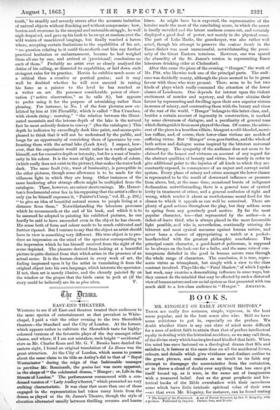v j e pain
EAST-END THEATRES.
WisniNn to see if all East-end theatres treated their audiences to the same species of entertainment as that prevalent in White- chapel, I paid a visit the other evening to the two Shoreditch theatres—the Standard and the City of London. At the former, which appears rather to cultivate the Shoreditch taste for highly- coloured versions of the favourite plays of the day amongst other classes, and where, if I am not mistaken, such bright "occidental" stars as Mr. Charles Kean and Mr. G. V. Brooke have dazzled the eastern sight, I found an original translation of Le Bossu was the great attraction. At the City of London, which seems to possess about the same claim to its title as Astley's did to that of "Royal Westminster" during the reign of that fashionable manager in partilots Mr. Boucicault, the genius loci was more apparent, in the shape of "the celebrated drama, " Hunger ; or, Life in the Streets of London." The performances commenced with a con- densed version of "Lady Audley's Secret," which presented no very striking characteristic. It was clear that more than one of those engaged in the representation had taken many hints from the drama as played at the St. James's Theatre, though the style of elocution alternated usually between thrilling screams and hoarse hisses. As might have been expected, the representative of the heroine made the most of the concluding scene, in which the secret is finally unveiled and the latent madness comes out, and certainly displayed a good deal of power, not merely in the physical sense. The part of Luke Marks, the gamekeeper, was also rather well acted, though his attempt to preserve the couleur locale in ther Essex dialect was most unsuccessful, notwithstanding the proxi- mity of the Great Eastern terminus. However, one was spared the absurdity of the St. James's version in representing E.sser labourers drinking cider at Chelmsford.
After this came the piece of the evening, "Hunger," the work of Mr. Pitt, who likewise took one of the principal parts. The audi- ence was decidedly scanty, although the piece seemed to be in great favour with those who were present. Thera seem to be but two kinds of plays which really command the attention of the lower dames of Londoners. One depends for interest upon the violent excitement of murder and mystery, and the other obtains their favour by representing and dwelling upon their own superior virtues in scenes of misery, and contrasting them with the luxury and vices of the rest of the world. "Hunger" belongs to this latter class, and, besides a certain amount of ingenuity in construction, is marked by some cleverness of dialogue, and a peculiarity of general tone which distinguish it from most plays of the class. Of course, the aristc- crat of the piece is a heartless villain; his agent a cold-blooded, merci- less ruffian, and, of course, their lower-class victims are models of suffering virtue. But "Hunger" even goes further, and the whole of
much uismisanthropy. throillpyand.Idialogueh The sympathy does notsteeumnivwersabel astry of inspired fraueddibenyctehde claimed for the honest and virtuous on account of any regard for the abstract qualities of honesty and virtue, but merely in order to give additional point to the injuries of all kinds to which they are constantly exposed, in consequence of an unjust and corrupt social system. Every phase of misery and crime amongst the lower classes is represented to be the result of downward influence or pressure from above, but, at the same time, occasional bursts of indignant declamation notwithstanding, there is a general tone of cynical levity in treatment of crime, and a general confusion of right and wrong, which render it about as unwholesome moral food for the classes to which it appeals as can well be conceived. There are plenty of good actions throughout the play, but they seldom seem to spring from any genuinely good motive. By far the most popular character, too—that represented by the author—is a ticket-of-leave thief, who is always placed in the most favourable light possible, and who is, nevertheless, continually uttering the bitterest and most cynical sarcasms against human nature, and never loses a chance of appropriating a watch or a pocket- handkerchief with the greatest philosophic nonchalance. The- principal comic character, a good-hearted policeman, is supposed to be always on the look-out for a bribe, and the same vein of con- temptuous disbelief in the good in human nature runs through the whole range of characters. The conclusion, it is true, repre- sents virtue as triumphant, but simply with a view to the class contrast involved. Plays like the "Fatal Shadow," of which I spoke last week, may exercise a demoralizing influence in some ways, but they cannot do the mischief that may be effected by such a distorted viewof humannature and our social system as that presented with too to a low-class audience in "Hunger." AMATEUR.






























 Previous page
Previous page